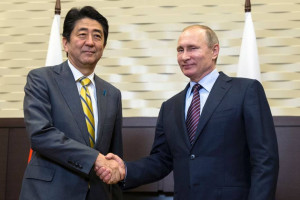
It should be noted than no more than four months ago Russia’s leader Vladimir Putin paid an official visit to Tokyo. If one is to take into account the fact that Putin and Abe have held a total of 17 bilateral discussions on various occasions, it’s safe to assume that out of all the Western leaders, and Abe falls into this category due to Tokyo’s alignment, Japan’s Prime Minister has been the one most open for all sorts of discussions.
This phenomenon can partially be explained by the special attention that Tokyo has been paying to the so-called “problem of the Northern Territories”, while Moscow is particularly interested in pursuing economic cooperation with Japan. Recently, both countries have found themselves facing an ever increasing number of foreign policy challenges, which forces them to adapt to the situation.
As the situation in the Asian-Pacific Region is getting increasingly more complicated, especially on the strip stretching from the Korean Peninsula to the Straits of Malacca, stimulates leading players to maintain closer contacts in order to react quickly to the challenges at hand, and hardly anybody doubts the notion that that the Russian Federation and Japan are at the forefront of regional politics these days.
The number of crises that occur in the region each year can seem startling to anybody who is not familiar with the situation in the Asian-Pacific Region. However, since the end of 2016, and up until this point the uneasy tensions on the Korean Peninsula have been the eyeball of most international media sources and all sorts of political analysts. Therefore, the deepening security crisis which can quickly transform itself in a global issue has been the main topic discussed by Putin and Abe.
However, it must be noted that neither Russia, nor Japan plays first violin in the “big political game” on the Korean Peninsula. The principal players in the Korean face-off are the United States and China. Therefore, it seems quite natural that the leader of Japan, that enjoys close ties with the United States, came to Moscow with a position that was approved by Washington.
There is also no doubt that the outcome of Abe’s talks with Vladimir Putin will be brought to the attention of the White House once Japan’s Prime Minister arrives to London. The latest Washington’s position on the situation on the Korean Peninsula was formulated mere days before Abe’s trip to Russia, according to which the DPRK is going to be perceived as a regular violator of various UN Security Council resolutions. With the aim of ending those “violations”, the US, along with its allies, is planning to apply both the diplomatic and economic pressure on Pyongyang. There’s no doubt that the White House will urge all of the regional players to observe this position.
However, it should be added that this “pressure” is being accompanied by various military provocations, the most recent of which was the US nuclear submarine Michigan entering one of South Korean ports.
In turn, both China and Russia, while recognizing the validity of claims against Pyongyang, would point out the latter has been under severe pressure of a possible military military confrontation with South Korea for a while now. Therefore, the dangerous aggravation of the situation on the Korean Peninsula can only be disarmed by the temporary freezing of the North Korean Nuclear Missile Program along with the simultaneous suspension of the large-scale US-South Korean military exercises that are being conducted near the DPRK border.
In principle, this period could be used to solve a number of fundamental problems on the Korean Peninsula. However, the crisis cannot be completely solved without Washington changing its aggressive posture on the international arena. However, the sitting US administration has decided to turn its back on the attempts to solve a lrage number of internal problems of modern America.
What this means is that Washington will need the image of the “unpredictable North Korean regime”, although the US has lately been in no position of accusing others of “unpredictability” after the sudden missile attack against Syria.
Therefore, the discussion of the Korean crisis problem that was held by Abe and Putin was essentially an attempt to restart the talks in the larger format that would include the United States, China, Russia, Japan and both Koreas. All talks within this framework were interrupted back in 2008 due to yet another aggravation of the crisis.
As for the bilateral relations, the discussion continued on to the preparations for the signing of a bilateral peace treaty between Russia and Japan, since there’s been no such document to be signed since the end of World War II. Additionally, a number of agreements on joint economic projects was successfully concluded.
The author of this article believes that the discussion of recent negotiations serve as a perfect background for some personal thoughts on Russia’s positioning in the APR. First and foremost, Russia must make its pivot to Asia much more explicit. However, this process is being complicated by an array of issues that have been plaguing the troubled Japan-China relations, in which, however, some positive signs could still be observed.
Russia is not interested in Washington’s (hypothetical) withdrawal from the subregion of Northeast Asia, so the major players like the United States, China, Russia and Japan should work together to coordinate their actions in it. Under the existing format of Russian-Chinese relations there should be no gaps left in bilateral ties that could present an opportunity to third players to drive a wedge between Beijing and Moscow.
Vladimir Terekhov, expert on the issues of the Asia-Pacific region, exclusively for the online magazine “New Eastern Outlook.”
